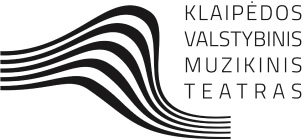KLAIPĖDA FESTIVAL
First-class productions in a historic shipyard
Klaipėda Festival, first organised by the Klaipėda State Music Theatre in 2021 as a high-profile international event for opera, dance and classical music, has over the past few years become one of the hottest spots of Lithuania’s cultural life, attracting throngs of enthusiastic audiences to the Baltic seaside at the height of the holiday season in the beginning of August. Its claim to singularity lies primarily in its rugged outdoor setting, which one would not normally see as a prime venue for opera and classical music performances. The historic Lindenau shipyard, located between the site of the now-ruined medieval Klaipėda Castle (known as Memelburg in German) and the Curonian Lagoon, has nevertheless become the festival’s calling card and an inexhaustible source of inspiration for theatre artists, who struggle to find new solutions to unlock the potential of this industrial heritage object in their spectacular productions. Among the important highlights of the festival is also the three-decade long tradition of marking the city’s birthday every year on 1 August with a special premiere presented by the Klaipėda State Music Theatre.
In 2020, to celebrate this occasion and the 200th anniversary of musical theatre in Klaipėda, the Klaipėda State Music Theatre presented its first production of Richard Wagner’s opera The Flying Dutchman at the shiplift site of the Klaipėda old shipyard, including a real ‘ghost ship’ as its focal element. Wagner and his early ‘romantic’ opera were chosen for a reason: the idea to compose The Flying Dutchman was inspired by the composer’s prolonged voyage on the stormy Baltic Sea, which he had also travelled to Klaipėda (known as Memel at the time) a few years earlier, while on a tour with the Königsberg Municipal Theatre opera company and orchestra in the role of its second Kapellmeister in August 1836.
The production has been instantly hailed as one of the country’s most celebrated cultural events of the year, drawing accolades for its originality, finest artistic quality, and ingenious welding of the historic location and modern equipment. It was the success of The Flying Dutchman that gave impetus to a new international festival, which set out to put Klaipėda on the map as a front-running city for culture and throw into broad relief its unique urban, (multi)cultural and natural heritage. These goals are not only reflected in the main programme but also widely discussed in the festival forum, where well-known artists, scientists, social activists and leaders come together to discuss topics of relevance to the city and the surrounding coastal region.
A festival stage open to the elements
The first modern shipbuilding company in Klaipėda, then known as Memel, was founded in the aftermath of World War I by Paul Willy Lindenau (1882–1955), an engineer from Vėluva (Wehlau) in East Prussia. The Lindenau shipyard, which operated between the two world wars from 1919 to 1944, had its own power plant, a metal foundry, various specialised machine shops, two floating docks and three ship lifts. The only one of them that has survived to this day is the unfinished grand ship lift, whose metal frames, hoists, cranes and other objects today serve as natural backdrop to Klaipėda Festival’s major projects including productions of operas and dance performances, large-scale musical works and appearances of the world-famous soloists and touring companies.
Combine the shipyard’s industrial architecture and the silhouettes of ships passing through the lagoon with theatrical sceneries mounted within its frames; seaside harbour ambiance with excellent acoustics masterfully controlled by means of modern technology; unpredictable weather conditions with tons of water pouring down and storms raging on the open-air stage, and it’s easy to see why the festival promises such an unparalleled experience not to be missed by opera, dance and classical music fans.
